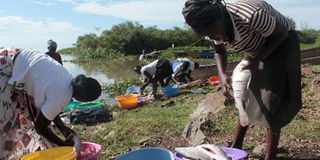Of dodgy costly fish and some other tales

Women clean Tilapia fish captured from Lake Victoria. We are fast losing the most basic right of all, to control what we put in our own mouths and bodies — and we have the disease burden to show for it. FILE PHOTO | TOM OTIENO | NATION MEDIA GROUP
What you need to know:
- Cooking rules are that fish generally turns whiter, then rubbery before flaking apart if overcooked, according to lessons from my mother.
- Fisher-folk from Kilifi to Siaya sold only the freshest prawns, taffy or tilapia.
- Countless authorities all over the world have linked over-processing, prolonged storage and chemical preservatives in food to these lifestyle illnesses.
- That we eat poor quality food in a country blessed with every resource necessary for food production is a fat shame.
When fish fillet bought from the supermarket turns into an unappetising glue-coloured mess in my cooking pan alarm bells ring.
Cooking rules are that fish generally turns whiter, then rubbery before flaking apart if overcooked, according to lessons from my mother.
Retrieving the plastic packaging from the dustbin to find out more about this fish yields nothing.
The packet simply reads: “Fish fillet” and the date on which it was packed.
It says nothing about the type of fish or when and where it was caught or processed.
FACELESS FORCES
Nothing about how it has been preserved or any additives.
The fish, too, ends up in the bin.
Having spent Sh600 on half-a-kilo of fillet, it seems my meal has been sabotaged by the nameless, faceless forces shaping the food market.
Through the social, political and economic upheavals since independence one thing we have always been sure of is the quality of wholesome fresh food at reasonable prices.
We never doubted that Njoro’s dairy farmers sent wholesome milk to market.
DISEASE FREE
Beef from Kajiado or Isiolo was always clean and disease free.
Fisher-folk from Kilifi to Siaya sold only the freshest prawns, taffy or tilapia.
Fruit from Kibwezi was transported to deliver its sweetest promise to the market.
The granaries of the Rift Valley brought the best wheat, millet, maize and sorghum.
In recent years middle-men and women have come, whose only motive appears to be profit at any cost.
DONKEY MEAT
Tales of dog and donkey meat sold as beef, milk diluted with chemicals for freshness, vegetables grown in sewage and fish that behaves in a very un-fishy manner have become the norm.
We are fast losing the most basic right of all, to control what we put in our own mouths and bodies — and we have the disease burden to show for it.
Cancer is now a leading cause of illness and death.
Countless authorities all over the world have linked over-processing, prolonged storage and chemical preservatives in food to these lifestyle illnesses.
Clearly outdated, the Food, Drugs and Chemical Substances (General) Regulations 1978 are of no real help.
FROZEN FISH
For example, they offer no standards for frozen fish. So long as someone calls it fish and it is frozen it will pass, according to Part X, 127.
The regulations require proper labelling of food in one section then says that food sold in bulk or packaged from bulk does not have to be labelled.
The Fisheries Management and Development Act 2016 is more concerned with development of the sector than food standards.
That we eat poor quality food in a country blessed with every resource necessary for food production is a fat shame.
We should rally around the proposed National Food Policy Authority.
PROTECTING HEALTH
It will have a key role of protecting health and facilitating the development of the food industry and fair practice in food trade.
It will guarantee that we know where our food comes from right from the farm through all processing until we eat it.
Discussions are taking place under the Kenya National Food Safety Coordinating Committee (NFSCC), which brings together representatives of government institutions responsible for food safety control.
It is led by the ministries of Agriculture and Health.
GREAT FOCUS
Missing from the talks are representatives of consumers.
This is probably why to date the NFSCC appears to have placed great focus on safeguarding export markets.
As an NFSCC member, the Kenya Bureau of Standards should set and enforce standards for information on food packaging.
Where and when food is produced, expiry date and all ingredients in a clearly legible type-face.
Until this is done it’s back to the produce market where I can judge for myself the fresh colour of the fish eye and wait while it is filleted.
Ms Lukalo heads the Media Policy Research Centre. [email protected]





